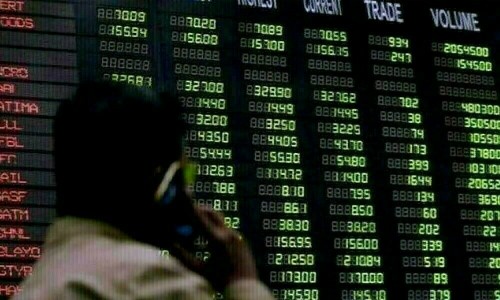Negative Trend Observed at Pakistan Stock Exchange
The Pakistan Stock Exchange (PSX) experienced a downturn as trading commenced on Monday, with the KSE-100 Index registering a loss of over 350 points in the initial minutes.
As of 9:40 am, the benchmark index stood at 118,736.04, reflecting a decrease of 366.63 points, equivalent to a 0.31% drop.
Notable selling activity was evident across several key sectors, including automobile manufacturers, oil and gas exploration firms, oil marketing companies (OMCs), and power generation entities. Major stocks such as HUBCO, OGDC, PPL, POL, MARI, PSO, and SSGC were all trading negatively.
Throughout the previous week, the PSX faced continuous strain as investors exhibited caution in anticipation of the upcoming federal budget. Increasing anxieties regarding potential tax measures contributed to a sustained decline in market performance.
The KSE-100 Index fell by 546.47 points, marking a 0.45% decrease week-on-week (WoW), ultimately closing at 119,102.67 points, a reduction from the prior week’s 119,649.14 points.
Globally, Asian stock markets generally saw gains on Monday, while the euro strengthened after President Donald Trump unexpectedly extended the deadline for imposing 50% tariffs on EU goods. This extension offered a temporary respite amidst his unpredictable trade strategies.
On Sunday, Trump postponed trade talk deadline to July 9, moving it from the June 1 date initially announced on Friday. This decision followed European Commission President Ursula von der Leyen’s statement that the EU required more time to “achieve a satisfactory agreement.”
Market sentiment had been stabilizing following a significant sell-off in most asset classes the previous month. This was partly due to Trump’s suspension of growth-inhibiting tariffs and renewed investor interest in prospective trade agreements, including a deal with the UK and a provisional understanding with China.
Nonetheless, President Trump’s recent policy shifts serve as a reminder to investors of the potential for rapid changes. Analysts have observed a trend of investors shifting capital away from the US towards Europe and Asia, factoring in a potential US recession and subsequent global economic slowdown.
Apple also encountered trade-related challenges on Friday, as Trump threatened to impose a 25% tariff on all imported iPhones purchased by US consumers.
On Monday, MSCI’s broadest index of Asia-Pacific shares outside Japan increased by 0.12%, while Japan’s Nikkei experienced a slight rise.
This information constitutes an intra-day market update.



Comments (0)
No comments yet. Be the first to comment!
Leave a Comment